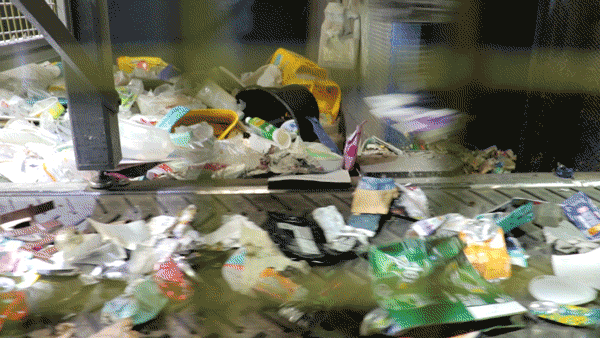"Cherlotte" ordered a medium (ahem, grande) nonfat latte with two pumps of toffee nut syrup. She drank down the Starbucks fuel and, instead of tossing it, saved the coffee-stained cup for a photo op.
This was not an Instagram thing. "Cherlotte" is actually Charlotte Pitt, head of Denver's recycling program. The Starbucks label was wrong, a result of human error (or maybe human efficiency?). Pitt's cup became one of many used as props Friday during a press conference at the Altogether Recycling center, a division of Alpine Waste and Recycling, to plug the addition of paper cups to the city's recycling repertoire. Denver contracts with Altogether for its recycling needs.
So, yeah, if you were tossing paper cups into your purple bins, you were doing it wrong, but not anymore. The fact that paper cups are no longer garbage is nice for eschewing waste. But it's not the hugest deal in the scheme of things. Paper cups will raise the city's recycling rate by just 0.2 percent, Pitt estimates. That's about one bale -- the trash cubes seen in these photos -- per month.
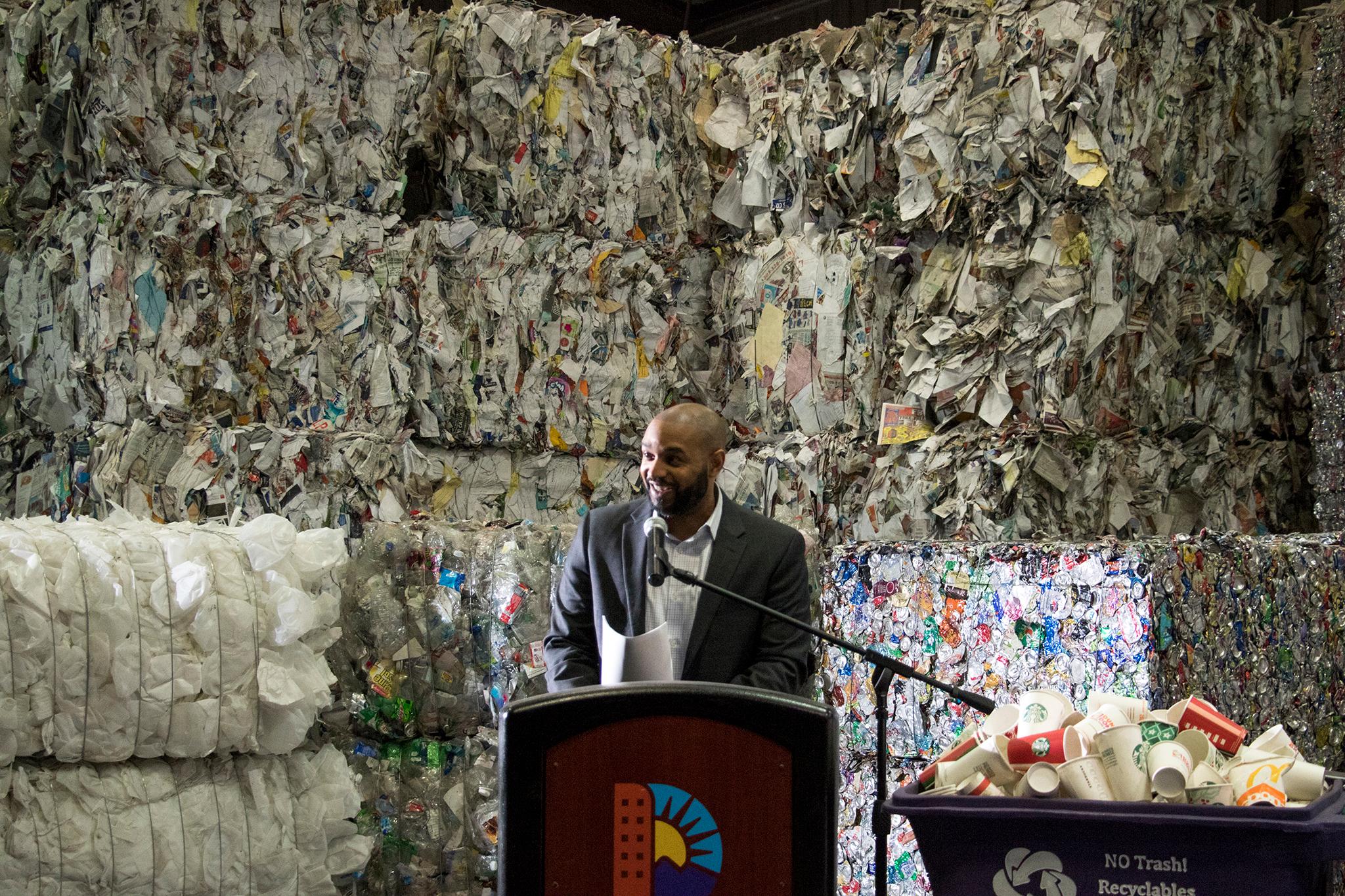
"The paper cups, really, are gonna make just a minor difference because the paper is so light and we measure everything by weight," Pitt said. "But it is one more thing that people couldn't recycle before and now they can.
"It's also a good opportunity for us to reinvigorate recycling, because even though we have good recyclers in Denver, there's still more we can do."
A lot more. The city's goal is divert 34 percent of its waste from the landfill, via recycling and composting, by 2020. Currently sitting at just 22 percent, Denver won't reach that goal. Peer cities like Austin, Seattle and Minneapolis boast rates of about 42 percent, 59 percent and 36 percent, respectively.
Denver would need to recycle and compost an extra 31,000 tons a year -- just one pound per household -- to meet the challenge.
But the city is pretty much maxed out on the materials it can recycle, so it's up to Denverites to recycle and compost more.
One tactic is to deliver city-sanctioned purple recycling bins to every household. Only 82 percent of homes have a recycling cart, and that's only because they opted into the program. Denver Public Works will deliver purple bins to the remaining households this month "because it's just too much time and effort to get people to sign up," Pitt said.
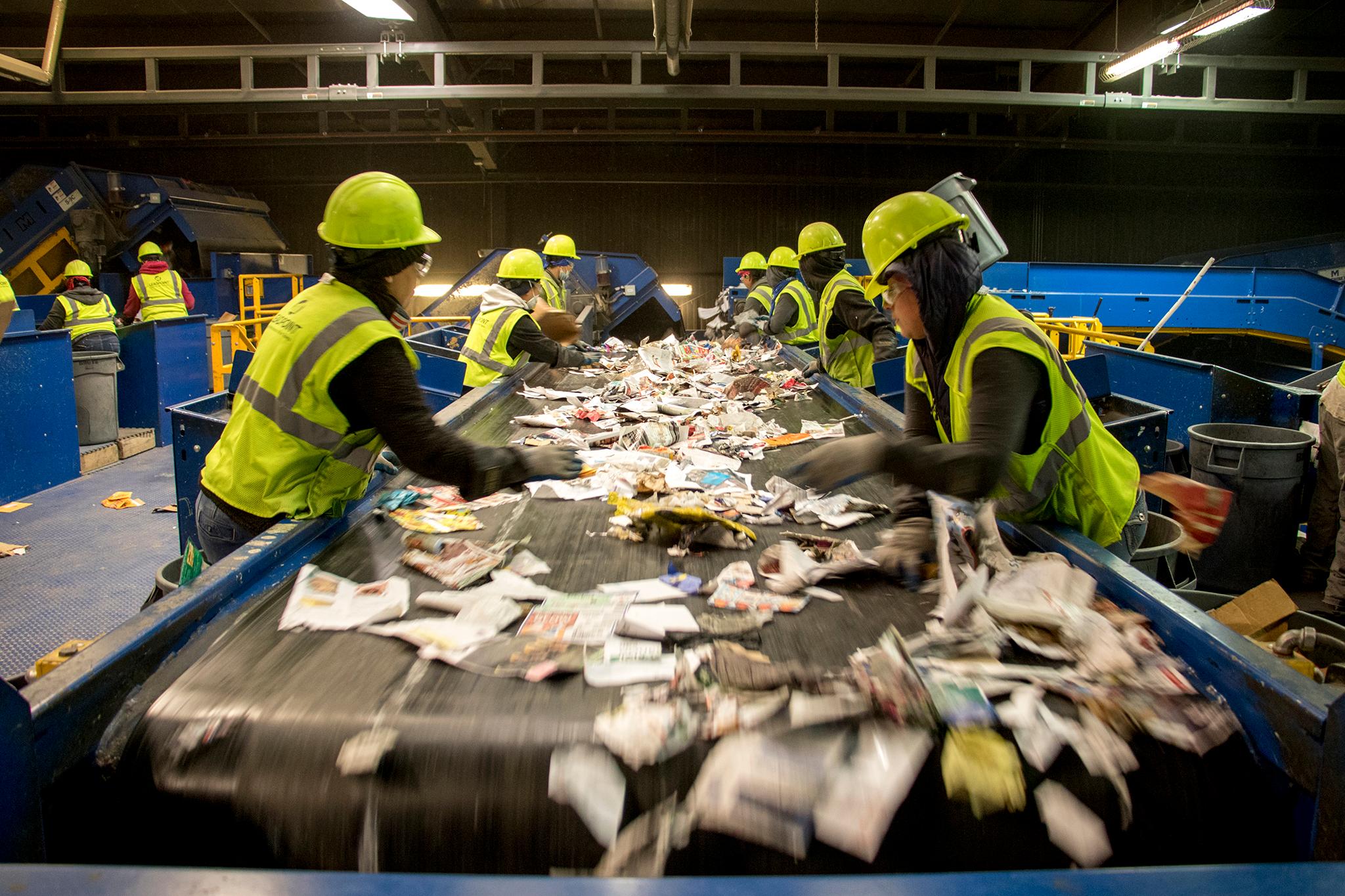
If you're keeping score at home, City Councilman Chris Herndon's precinct, which includes Park Hill, Stapleton, Northfield and part of Montbello, is home to the city's best recycling rate. The precinct with the worst recycling rates sits next door and includes Green Valley Ranch and most of Montbello.
"I think we need to make sure that we're doing a lot of education and outreach and that we're normalizing the conversation," said City Councilwoman Stacie Gilmore, who represents that district. "It's one of those things -- we've just got a lot of working families that are just busy, working multiple jobs. And it's really about their bandwidth to do it."
Her district's recycling rate has improved over recent years, Gilmore said.
Yuderkarely Campos hovered over an infinite conveyor belt and sorted millions of scraps from our daily lives -- Juicy Juice boxes, McDonald's fry pouches, Modelo beer cans. A few feet away, a robot did the same thing.
The robot, affectionately known as Clark, was invented by Colorado's AMP Robotics. It looks kind of like a mechanical mosquito hanging from the ceiling with a Pogo stick mouth. It does with artificial intelligence what Campos does with organic intelligence.
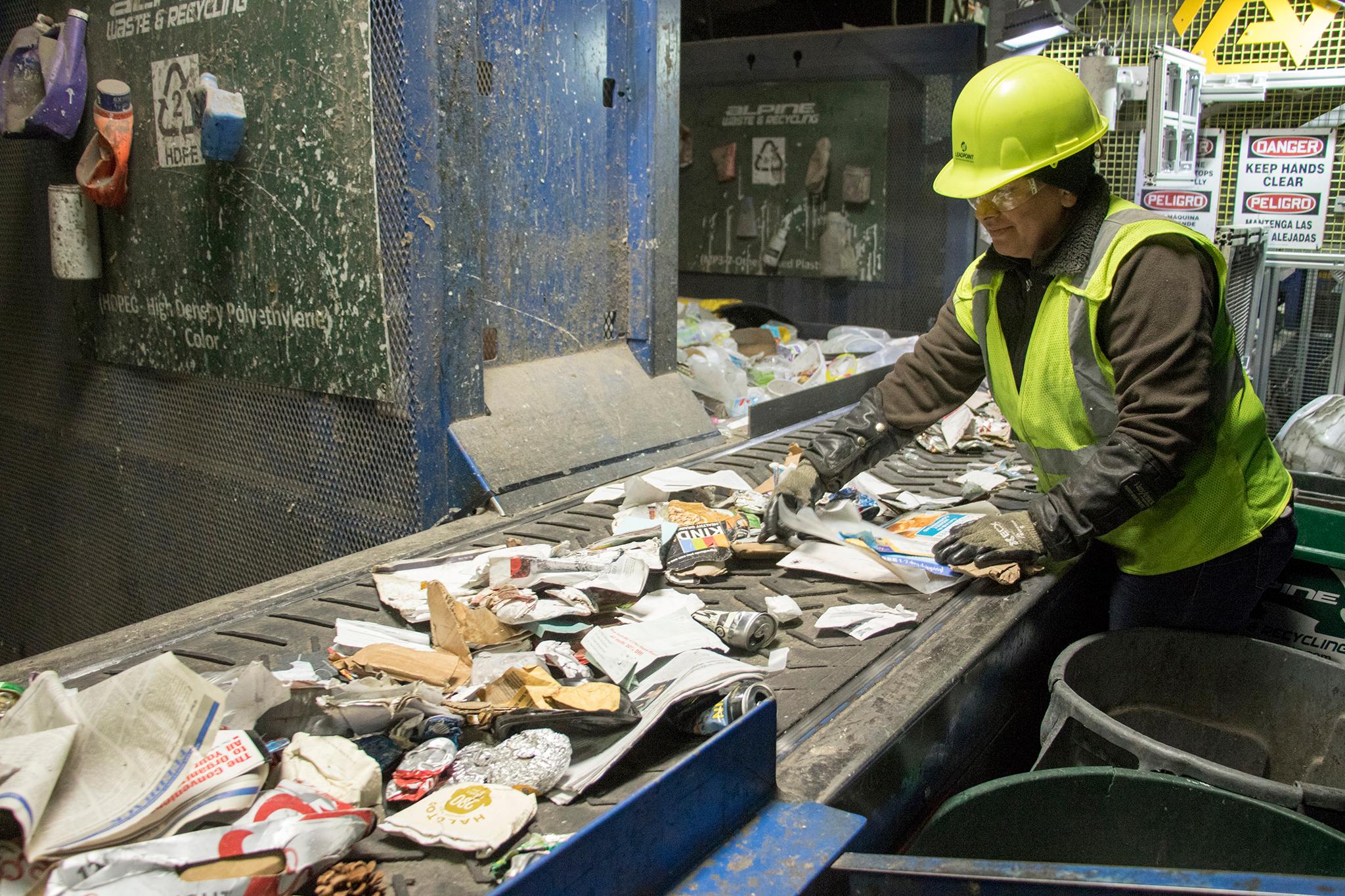
Except Clark, part of a line of robots called "Cortex, "uses a powerful vacuum to suck up the trash and fling it into the correct bin, where it's baled and bound for the open market. And it can sort one item per second.
"Right now we're teaching it what the paper hot and cold cups look like," said Matanya Horowitz, who invented Clark and founded AMP. "So it hasn't really figured out what they look like, but once it does, we'll enable that for Alpine."
Yes, the robo-picker learns. Its eyes are a camera that watches the trash fly by, records what's what, and with each glimpse, Cortex learns to identify materials a little better. Right now it's looking for aseptic cartons, but can be programmed to pick up anything. Naturally, it's learning to identify the recycling plant's latest addition.
Does this mean that someday the robots will recycle us?
Alpine's plant is filled with assembly line workers sorting trash, bulldozer operators moving trash, and drivers hauling trash. But Cortex is the only team member with artificial intelligence.
That could very well change as the industry does. China stopped buying America's recycled plastic, meaning smaller profits for United States companies. Then there's Denver's healthy job market to consider, which has meant shortages in the manual labor industries, like construction and bus driving.
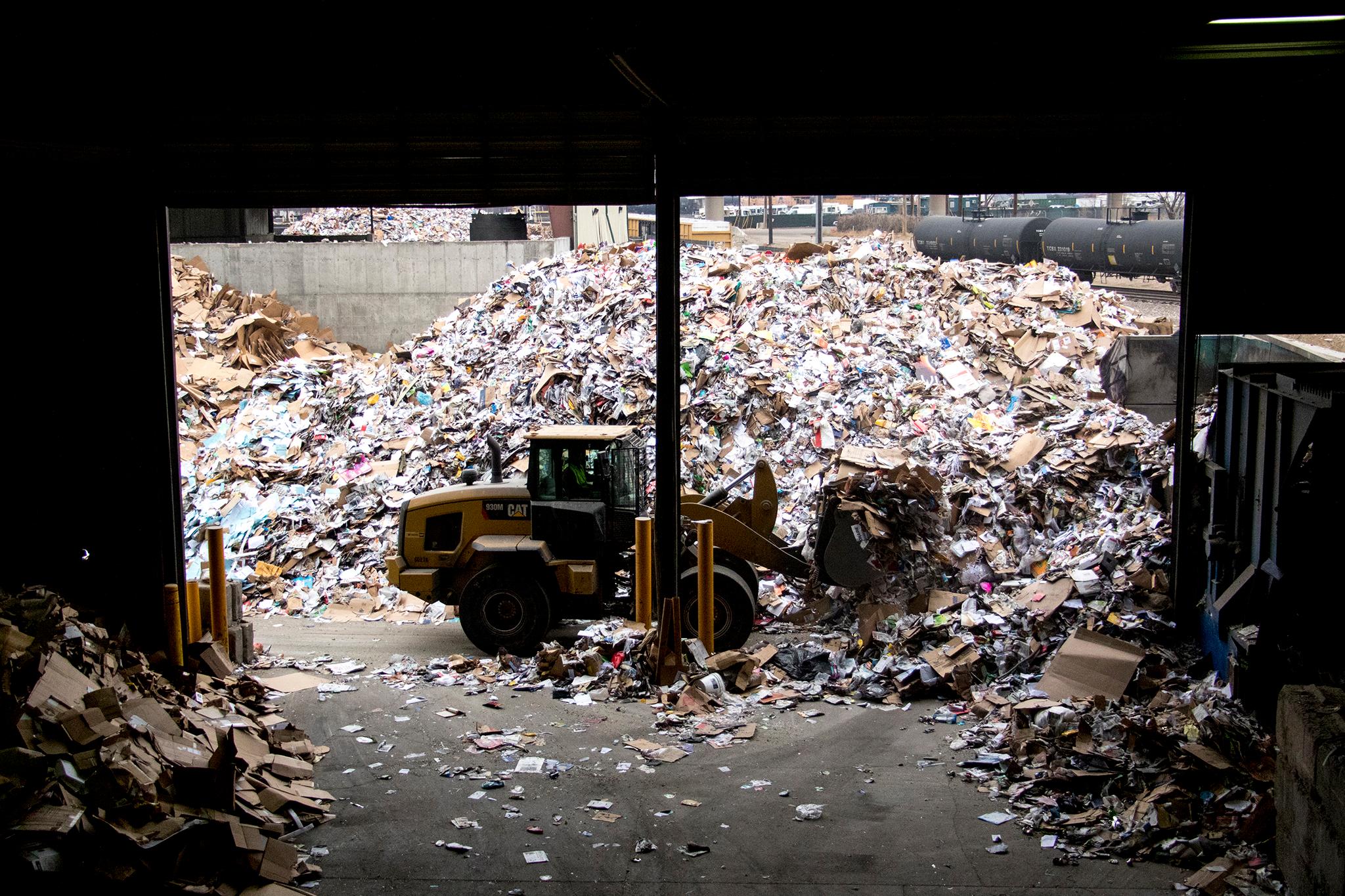
Meanwhile AMP, which markets itself as a "scalable recycling company," has installed eight similar robots at plants around the country, Horowitz said, and is "putting in more basically all the time." AMP's website sells potential clients with a promise to increase output "when Cortex shows up for every shift, every day."
Automation -- and its effect on human jobs -- is nothing new, says Virginia Leavell, a PhD student at the University of California-Santa Barbara who studies automation and technology management. The question is how society reacts to it.
"On the face of it, automated work could be just a neutral idea," Leavell said in an interview. "Imagine a society where we had automated jobs that were dangerous or unpleasant. But the fact is that in the society that we live in, the automation is used by management to cut labor costs and increase profits."
Leavell points to the automation of America's ports, where machines began replacing men and women. Organized labor unions who saw the inevitability of technology's role in the industry, compromised with some port companies to essentially grandfather employees in, she said, so that their jobs were safe until retirement.
Automation can negatively affect wages, researchers from the Massachusetts Institute of Technology found.
"Tech is a social process. Workers should have a say also," Leavell said. "We are told we need to do this for the future, but we can't just steamroll present workers in the present day."
This article was updated with the correct name of the recycling center.

